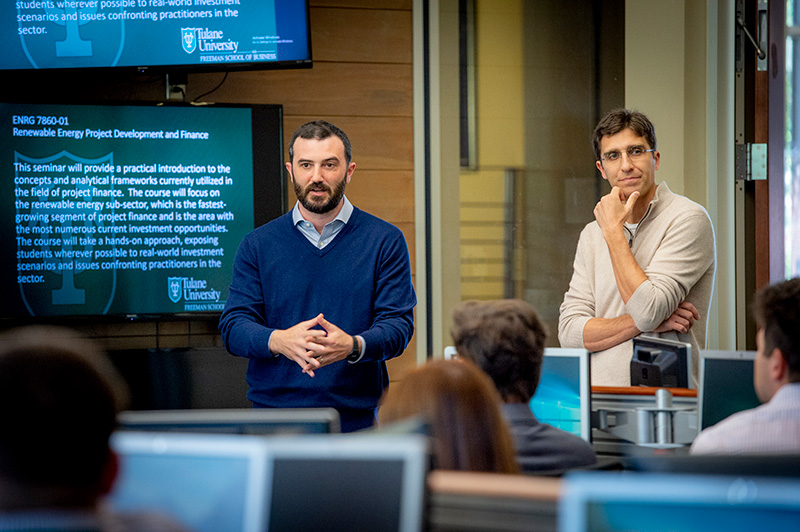
As director of Make It Right Solar, the for-profit renewable energy subsidiary of Brad Pitt’s Make It Right Foundation, Pierre Moses completed more than 250 solar photovoltaic (PV) projects in New Orleans in the early 2010s. But when he began working on his MBA at the Freeman School in 2014, he noticed a gap in the school’s energy courses.
“There was a large group of local industry workers who were doing pretty cool things with renewable energy project finance, but it wasn’t being represented in the Tulane energy curriculum,” says Moses (MBA ’16). “I wanted to improve the breadth of the spectrum they were offering.”
This fall, Moses returned to Freeman to teach Renewable Energy Project Development and Finance, the first offering in the Master of Management in Energy program’s new specialization in renewable energy. The course, developed with co-instructor Josh Herlands, emphasizes the practical knowledge and skills needed to bring renewable energy projects from concept to completion.
“It’s going to be a real-life, hands-on course,” says Moses. “By the time students complete this course, they’ll have a thorough understanding of project finance and an active financial model they can apply directly to renewable projects.”
“We’ll be working with hypothetical and redacted project documents, investment committee memos, and financial models that are based on deals from not 10 years ago, but from 10 days ago,” adds Herlands. “This is as practical as it gets.”
Moses and Herlands each bring more than a decade’s worth of experience in renewables to the course. Moses is the president of 127 Energy, a renewable energy development firm focused on financing and building solar PV and energy storage projects, while Herlands is a founding partner of Stillwaters Management, an investment firm specializing in clean energy and infrastructure assets.
While the course will cover wind, hydro and biomass, its emphasis is on solar energy project economics.
“We see solar as having the largest new capacity growth over the next decade or two compared to other renewable technologies,” Moses says. Despite that focus, Herlands says the course will be valuable to anyone interested in pursuing a career in energy.
“Renewables are increasingly a key piece of the power and utility landscape, but we can’t talk about them in a vacuum,” Herlands says. “What people will get out of this course is not only an understanding of renewables, but also, ideally, a deeper understanding of the power, utility, infrastructure and project finance sectors.”
“I think there will be lots of overlap with other facets of the energy program,” adds Moses. “We’ll talk about emerging power markets and renewable energy credits and other attributes that are traded on an open marketplace, but we’re going to go deep into actual projects. We think students coming out of this course will have a unique skill set based on the tangible
aspects of the financial models and project documentation we’ll be diving into.”


